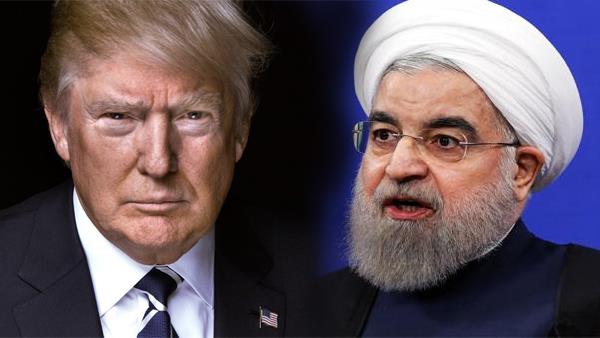
Tehran threatens to quit if US walks
TEHRAN, May 3, (Agencies): Iran warned on Thursday (May 3) it will quit a landmark nuclear deal if President Donald Trump pulls the United States out of the accord, while also criticising European states over 'concessions' to the Americans.
Trump has threatened to abandon the agreement when it comes up for renewal on May 12, demanding his country's European allies 'fix the terrible flaws' or he will re-impose sanctions. The nuclear deal was struck in 2015 between Iran and Britain, China, France, Germany, Russia and the United States, then led by Barack Obama.
Under the pact, sanctions were lifted in return for a commitment not to pursue a nuclear bomb, but Iran says it is not reaping the rewards despite complying with the deal. 'If the United States withdraws from the nuclear deal, then we will not stay in it,' Ali Akbar Velayati, foreign policy adviser to supreme leader Ayatollah Ali Khamenei, was quoted as saying by the state television website.
As Iran's all-powerful leader, Khamenei has the fi- nal word on all policy matters, foreign and domestic, including on the nuclear deal. Iran's foreign minister, Mohammad Javad Zarif, also issued a warning to the United States on Thursday in an English-language video posted on You- Tube. 'If the US continues to violate the agreement, or if it withdraws altogether, we will exercise our right to respond in a manner of our choosing,' said Zarif.
'The US has consistently violated the agreement, especially by bullying others from doing business with Iran,' he said.
Iran criticises Europe
Zarif also criticised European nations. 'In the last year or so, we've been told that President Trump is unhappy with the deal, and it now appears that the response from some Europeans has been to offer the United States more concessions, from our pocket,' said Iran's top diplomat.
'This appeasement entails promises of a new deal that would include matters we all decided to exclude at the outset of our negotiations, including Iran's defensive capabilities and regional infl uence.' Zarif was responding to Britain, France and Germany who said on Sunday that the nuclear agreement left out some 'important elements'.
These included what happens when the current deal expires in 2025, Iran's ballistic missile programme and its 'destabilising regional activity', they said in a statement. The three European countries that signed the deal have repeatedly tried to persuade Trump not to abandon it.
French President Emmanuel Macron on Wednesday reiterated his commitment to the accord but admitted that it needed strengthening. 'I don't know what the US president will decide on May 12,' Macron said during a visit to Sydney. 'I just want to say whatever the decision will be, we will have to prepare such a broader negotiation and a broader deal, because I think nobody wants a war in the region, and nobody wants an escalation in terms of tension in the region,' he said.
The Islamic republic has always denied it sought a nuclear weapon, insisting its atomic programme was for civilian purposes. Velayati warned against any move to try to renegotiate the 2015 deal. 'Iran accepts the nuclear agreement as it has been prepared and will not accept adding or removing anything,' he said. 'Even if countries allied with the United States, especially the Europeans, seek to revise the nuclear agreement … one of our options will be withdrawing from the accord,' Velayati added.
Decision to withdraw
Trump, meanwhile, has all but decided to withdraw from the 2015 Iran nuclear accord by May 12 but exactly how he will do so remains unclear, two White House officials and a source familiar with the administration's internal debate said on Wednesday. There is a chance Trump might choose to keep the United States in the international pact under which Iran agreed to curb its nuclear program in return for sanctions relief, in part because of 'alliance maintenance' with France and to save face for Macron, who met Trump last week and urged him to stay in, the source said.
A decision by Trump to end US sanctions relief would all but sink the agreement and could trigger a backlash by Iran, which could resume its nuclear arms program or 'punish' US allies in Syria, Iraq, Yemen and Lebanon, diplomats said. Technically, Trump must decide by May 12 whether to renew 'waivers' suspending some of the US sanctions on Iran. One of the White House officials who spoke on condition of anonymity said it was possible Trump will end up with a decision that 'is not a full pullout' but was unable to describe what that might look like.
A presentation by Israeli Prime Minister Benjamin Netanyahu on Monday about what he said was documentary evidence of Tehran's past nuclear arms program could give Trump a fresh argument to withdraw, even though UN inspectors say Iran has complied with the terms of the deal. Iran has denied ever seeking nuclear weapons and accuses its arch-foe Israel of stirring up world suspicions against it.

Legal Disclaimer:
MENAFN provides the
information “as is” without warranty of any kind. We do not accept
any responsibility or liability for the accuracy, content, images,
videos, licenses, completeness, legality, or reliability of the information
contained in this article. If you have any complaints or copyright
issues related to this article, kindly contact the provider above.
















Comments
No comment